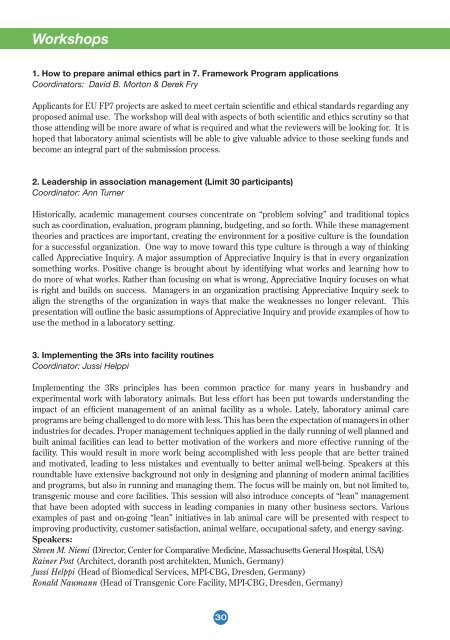Scientific programme - Scand-LAS
Scientific programme - Scand-LAS
Scientific programme - Scand-LAS
Create successful ePaper yourself
Turn your PDF publications into a flip-book with our unique Google optimized e-Paper software.
Workshops<br />
1. How to prepare animal ethics part in 7. Framework Program applications<br />
Coordinators: David B. Morton & Derek Fry<br />
Applicants for EU FP7 projects are asked to meet certain scientifi c and ethical standards regarding any<br />
proposed animal use. The workshop will deal with aspects of both scientifi c and ethics scrutiny so that<br />
those attending will be more aware of what is required and what the reviewers will be looking for. It is<br />
hoped that laboratory animal scientists will be able to give valuable advice to those seeking funds and<br />
become an integral part of the submission process.<br />
2. Leadership in association management (Limit 30 participants)<br />
Coordinator: Ann Turner<br />
Historically, academic management courses concentrate on “problem solving” and traditional topics<br />
such as coordination, evaluation, program planning, budgeting, and so forth. While these management<br />
theories and practices are important, creating the environment for a positive culture is the foundation<br />
for a successful organization. One way to move toward this type culture is through a way of thinking<br />
called Appreciative Inquiry. A major assumption of Appreciative Inquiry is that in every organization<br />
something works. Positive change is brought about by identifying what works and learning how to<br />
do more of what works. Rather than focusing on what is wrong, Appreciative Inquiry focuses on what<br />
is right and builds on success. Managers in an organization practising Appreciative Inquiry seek to<br />
align the strengths of the organization in ways that make the weaknesses no longer relevant. This<br />
presentation will outline the basic assumptions of Appreciative Inquiry and provide examples of how to<br />
use the method in a laboratory setting.<br />
3. Implementing the 3Rs into facility routines<br />
Coordinator: Jussi Helppi<br />
Implementing the 3Rs principles has been common practice for many years in husbandry and<br />
experimental work with laboratory animals. But less effort has been put towards understanding the<br />
impact of an effi cient management of an animal facility as a whole. Lately, laboratory animal care<br />
programs are being challenged to do more with less. This has been the expectation of managers in other<br />
industries for decades. Proper management techniques applied in the daily running of well planned and<br />
built animal facilities can lead to better motivation of the workers and more effective running of the<br />
facility. This would result in more work being accomplished with less people that are better trained<br />
and motivated, leading to less mistakes and eventually to better animal well-being. Speakers at this<br />
roundtable have extensive background not only in designing and planning of modern animal facilities<br />
and programs, but also in running and managing them. The focus will be mainly on, but not limited to,<br />
transgenic mouse and core facilities. This session will also introduce concepts of “lean” management<br />
that have been adopted with success in leading companies in many other business sectors. Various<br />
examples of past and on-going “lean” initiatives in lab animal care will be presented with respect to<br />
improving productivity, customer satisfaction, animal welfare, occupational safety, and energy saving.<br />
Speakers:<br />
Steven M. Niemi (Director, Center for Comparative Medicine, Massachusetts General Hospital, USA)<br />
Rainer Post (Architect, doranth post architekten, Munich, Germany)<br />
Jussi Helppi (Head of Biomedical Services, MPI-CBG, Dresden, Germany)<br />
Ronald Naumann (Head of Transgenic Core Facility, MPI-CBG, Dresden, Germany)<br />
30


